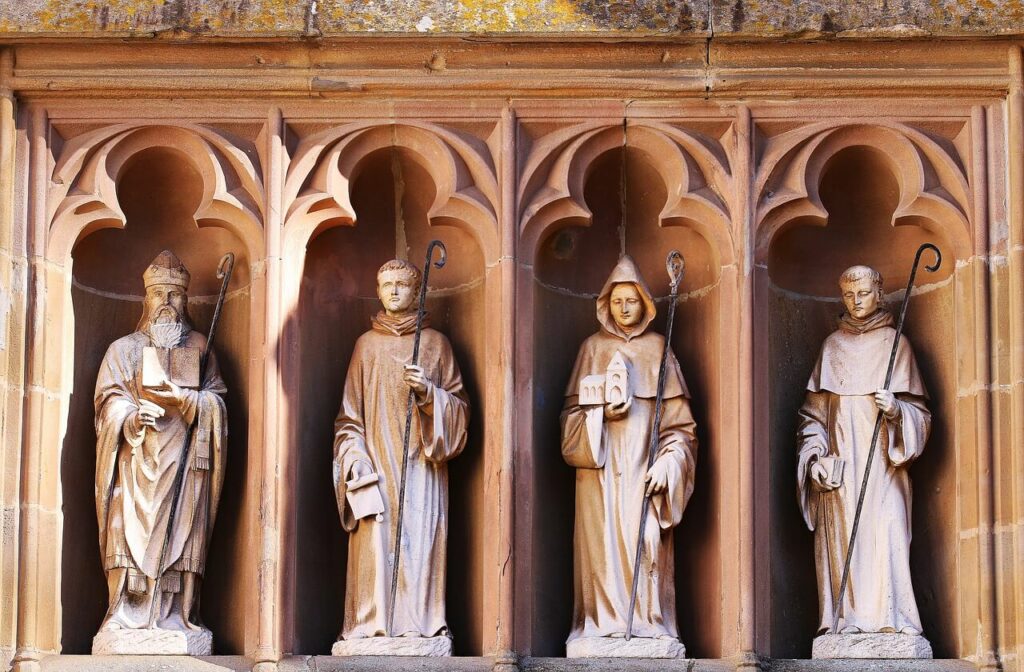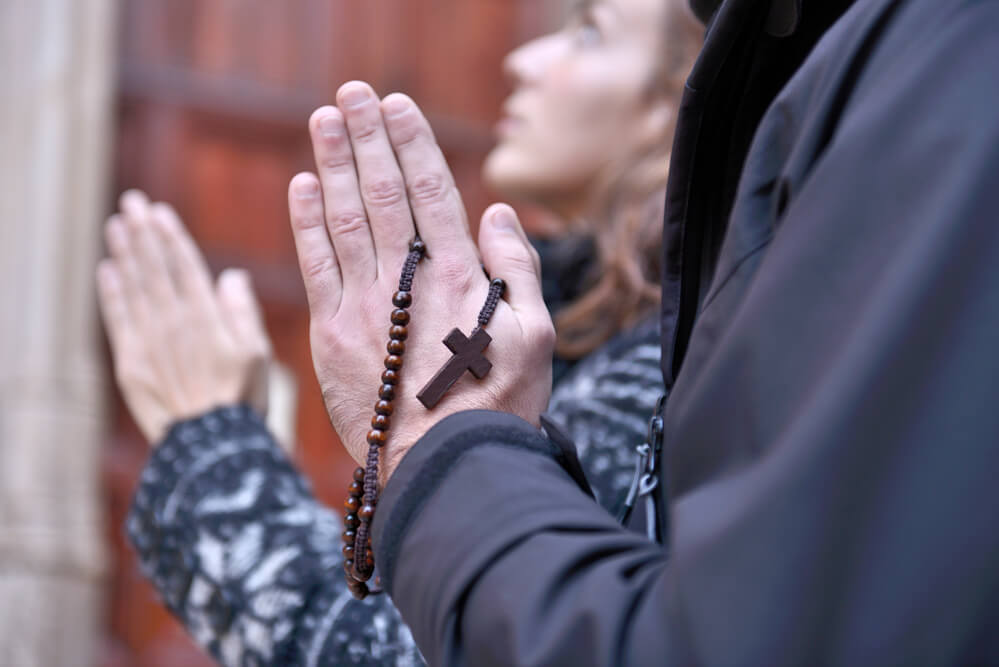We’ll start this explanation on saints in catholicism with an explicit answer: Catholics do not worship saints.
This is a common misconception especially among protestants and unbelievers. It goes hand in hand with the false claim that ‘Catholics worship idols’, directly against the first commandment.
However, when you hear Catholics mention the venerated Saint, Virgin Mary, in many of their prayers, they are not praying to her. Rather, they are asking her to intercede for them because of her closeness to God.
The same applies to all other Saints.
To understand why saints are so important in the Catholic Church, let’s examine the origin of the term and what exactly it means.
What You'll Learn Today
The Meaning of ‘Saint’ in the Catholic Church

Saint comes from the Latin word sanctus that means Holy. The common definition of a Saint is someone who is holy and set apart.
You may be surprised that the application of the term is both general, as well as reserved for special highly venerated individuals.
In the general definition, all Christians are sometimes referred to as saints. Paul does so in Collosians 1:2.
To the saints and faithful brethren in Christ which are at Colosse: Grace be unto you, and peace, from God our Father and the Lord Jesus Christ.
And here’s Romans 1:7.
To all who are beloved of God in Rome, called as saints: Grace to you and peace from God our Father and the Lord Jesus Christ.
And another mention in 2 Thessalonians 1:10.
When he comes on that day to be glorified in his saints, and to be marveled at among all who have believed, because our testimony to you was believed.
Some translations, including the NIV, will use the term ‘Holy People’ instead of saints, but it means the same thing.
The Bible makes clear that those who believe in Jesus are set apart and continually sanctified. Thus, they are very deserving of being called saints.
Of course, that doesn’t mean that we should go around giving ourselves saintly titles. That’s reserved for a special group of the faithful.
Saints in Heaven
The other application of the term Saint is to refer to the faithful that have gone on ahead of us. In fact, the Catholic Church recognizes any deceased faithful in heaven as a saint.
The reason why it seems every faithful gets to qualify being called a saint is that all believers are in the same communion – a single Body that’s the Church. This includes Christians from centuries ago, the faithful who are alive and our fellow brethren who have passed on into purgatory or heaven.
There are three parts to the Church.
- Church Militant refers to the faithful on earth; the soldiers of Christ who are in constant battle against sin and the devil. These are the ones for whom the general definition of the term ‘Saint’ applies. But they don’t get any titles.
- Church Penitent, church suffering or church expectant are Christians in purgatory. They are still saints because they are part of the communion.
- Church Triumphant refers to the faithful in Heaven. These are saints that have direct face to face communication to God, what’s called beatific vision.
That said, still not all saints in Church Triumphant are given the saintly title. This is reserved for highly venerated faithful who led heroic lives of service and suffering.
That’s why the church has a rigorous process before declaring someone a saint. But some figures in the Bible are automatically given the title because of their obvious holiness. A good example is the Virgin Mary, the most venerated saint.
The Catechism of the Catholic Church states:
The patriarchs, prophets and certain other Old Testament figures have been and always will be honoured as saints in all the Church’s liturgical traditions.
Importance of Saints in the Catholic Church

From here onwards, when we say ‘saints’, we refer to individuals that have been given the Saintly title by the Catholic Church.
These are individuals considered closest to God in Heaven. Thus, they are best positioned to intercede for us to God.
That’s why many people presume Catholics worship saints. While Catholics hold saints in high regard, have patron saints for certain causes or professions, and even have special days to celebrate some saints, they certainly do not worship them.
It’s the same way you might ask a fellow brother or sister to pray for you. The main difference is that a Saint is closer to God and can talk directly to him to plead your case.
Another reason Catholics ask Saints to intercede for them is that they understand the problems and sufferings they are going through. Most saints suffered greatly on Earth, and a good number are actually Martyrs. So they can sympathise with the trouble you are experiencing.
What About Idols?
Before we wrap up, let’s also clear the air on the ‘Catholics worship Idols’ misconception. Sculptures and items like the Rosary are merely images or visual aids to remind us of Jesus and encourage us to lead a Holy life.
Catholics do not worship idols, the Rosary, or Saints; they worship only God.
– title is very misleading – “why do catholics worship saints?” … (although you started your article that “catholics do not worship saints”).
– your title seems to imply that catholics worship saints and that your article will explain the why.
– wouldn’t the title to this article be better by removing “why”… instead, titling it as “do catholics worship saints?”
but good article nevertheless. the title just doesn’t seem fit.
You have one problem with your reasoning and that is the the Bible forbids bowing to images and statues wether one call it “visual aids” or “reminders.” There is not qualifier in the Bible that is one needs a reminder then it’s ok to bow to an image. Even though you claim that catholics do not pray to “saints” the fact is that they do. When you call on Mary to intercede for you, you in fact are praying (asking/begging her) to intercede for you. The Bible clearly teaches that there is only one mediator between man and God.
“For there is one God, and one mediator between God and men, the man Christ Jesus;” 1 Titus 2:5
When ever people have done it, even it they claim that they do not worship the object which they claim serves to remind them of God, it inevitably leads to revere it which is the essence of idolatry. This has always lead to disasters results as people turn away from the living God to created things, objects, animals, people.
Exodus 20:4-6
4 Thou shalt not make unto thee any graven image, or any likeness of any thing that is in heaven above, or that is in the earth beneath, or that is in the water under the earth:
5 Thou shalt not bow down thyself to them, nor serve them: for I the LORD thy God am a jealous God, visiting the iniquity of the fathers upon the children unto the third and fourth generation of them that hate me;
6 And shewing mercy unto thousands of them that love me, and keep my commandments.
Here is one common catholic prayer to Mary which says: “Hail Mary, full of grace, the Lord is with thee. Blessed art thou among women, and blessed is the fruit of thy womb, Jesus. Holy Mary, Mother of God, pray for us sinners, now and at the hour of our death. Amen.”
Notice that Mary is described as “full of grace.” The only one in the entire Bible described as “full of grace” is Jesus Christ.
“And the Word was made flesh, and dwelt among us, (and we beheld his glory, the glory as of the only begotten of the Father,) full of grace and truth.” Johh 1:14
Clearly this is taking what belongs to Jesus and ascribing to a mortal human being which is idolatry that the Bible condemns. You tried to show how the idea of saints is used in the Bible to refer to believers but then strangely said that saints are only special delivers that the Catholic church designates. So are all believers saints or some are more saintly that others?
She was referred to as full of Grace in Like 1:28 by the Angel Gabrel up until the protestant movements started changing the translations of the Bible and tossing books out. If you were so bold enough to look at a Pre-KJV bible you would see that its quite scriptural to say that she was Full 0f Grace.